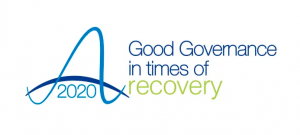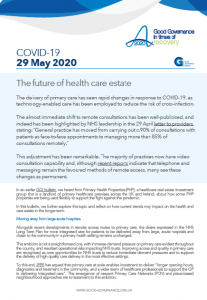The future of health care estate
29 May 2020

The delivery of primary care has seen rapid changes in response to COVID-19, as technology-enabled care has been employed to reduce the risk of cross-infection.
The almost immediate shift to remote consultations has been well-publicised, and indeed has been highlighted by NHS leadership in the 29 April letter to providers, stating: “General practice has moved from carrying out c.90% of consultations with patients as face-to-face appointments to managing more than 85% of consultations remotely.”
This adjustment has been remarkable. The majority of practices now have video consultation capability and, although recent reports indicate that telephone and messaging remain the favoured methods of remote access, many see these changes as permanent.
In an earlier GGI bulletin, we heard from Primary Health Properties (PHP), a healthcare real estate investment group that is a landlord of primary healthcare premises across the UK and Ireland, about how some PHP properties are being used flexibly to support the fight against the pandemic.
In this bulletin, we further explore this topic and reflect on how current trends may impact on the health and care estate in the longer term.
Moving away from large acute hospitals
Alongside recent developments in remote access routes to primary care, the desire expressed in the NHS Long Term Plan for more integrated care for patients to be delivered away from large, acute hospitals and closer to the community in a primary health setting remains unchanged.
This ambition is not a straightforward one, with immense demand pressure on primary care evident throughout the country, and resultant operational risks impacting NHS trusts. Improving access and quality in primary care are recognised as core opportunities for NHS trusts to reduce immediate demand pressures and to support the delivery of high quality care delivery in the most effective settings.
To this end, IPPR has argued that primary care at scale enables investment to deliver “longer opening hours, diagnostics and treatment in the community, and a wider team of healthcare professionals to support the GP in delivering integrated care”. The emergence of nascent Primary Care Networks (PCN) and place-based neighbourhood approaches are to testament to this ambition.
We are therefore faced with the question of what fit-for-purpose estate looks like in the context of the health and care integration agenda, and alongside a rapidly realised reduction in face to face GP consultations. It is important that this is not only classified as a ‘primary care issue’, but rather is addressed through a whole system approach by boards and governing bodies across health and care organisations.
Patient footfall through practices has dropped considerably in recent months, presenting a range of opportunities for evolving space needs. Notwithstanding the need to still see some patients face-to-face in a managed way, it has long been known that delivering primary care at scale requires more than GPs in consultation rooms. Moreover, much primary care estate has suffered from underinvestment and is not necessarily equipped to contribute to the delivery of modern integrated care.
The recent increase in GPs working from home has enabled flexibility in the response to the pandemic, however the future sustainability of this is yet to be tested. Considerations such as child care at home, client confidentiality, internet reliability, and GDPR are all exacerbated for a medical consultation and all need to be taken into account in the long term.
COVID-19 forces the pace
Could the trend towards increased utilisation of flexible spaces involving multiple partners in care delivery and community engagement be further accelerated by the impact of COVID-19?
The definition of primary care continues to be expanded through a population health approach that seeks to address root causes and improve outcomes for communities. Innovation and open risk appetite within general practice may align with opportunities to ensure flexible and effective use of estate, working collaboratively with a range of provider partners across health and care. A vision for this modern and resilient primary care can be seen in bringing together nurses, pharmacists, mental health specialists and allied professionals, as well as community groups and others.
Such efforts to co-locate primary, community and secondary care services have undergone many shifts in terminology and emphasis in policy over the years. The experience of polyclinics and other service hub initiatives will have much learning to offer PCNs, and perhaps the impact of COVID-19 can support a continued positive momentum of integration.
These GGI bulletins are intended to provide helpful reflections which support leaders in health and care to gather insight and strengthen assurance. In relation to the future of health and care estate and COVID-19, boards and governing bodies may wish to consider the following questions:
- How are Primary Care Networks approaching the opportunities to use estate flexibly in expanding the definition and delivery of primary care?
- What estate opportunities are presented for NHS trusts by the rapid increase in remote consultations in primary care?
This is a fascinating time for health and care, with a broad range of dynamics impacting the ways in which people access care, highlighting major implications and opportunities for the future estate. As Chris Santer, Chief Investment Officer at PHP, states: “We are proud to be working with our partners to deliver high quality primary care buildings, and are keen to ensure that flexible and modern healthcare facilities are contributing to effective integrated care for communities throughout the UK and Ireland.”
GGI is currently engaging in a piece of research with PHP to explore the future of primary care premises, commissioning patterns, and the influence of healthcare integration and digital access.
We will be publishing a report later in the year informed by engagement with the sector, and are keen to hear from a variety of perspectives. If you are interested in this topic and would like to discuss it, please call us on 07732 681120 or email advice@good-governance.org.uk.

Jessica Lubin
Digital Development Manager
Donal Sutton
Strategy Director
